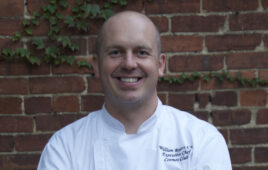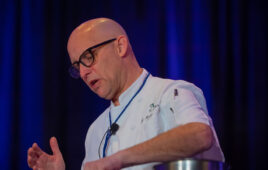Club chefs need supportive managers—and Daniel Chagolla, Executive Chef of Desert Highlands in Scottsdale, Ariz., has one in Chief Operating Officer Terra Waldron.
 Savvy club managers discover what is unique about the individuals on their team and find ways to capitalize on those special attributes. That’s certainly the case at The Desert Highlands Country and Golf Club Association in Scottsdale, Ariz., where Chief Operating Officer Terra Waldron promoted Daniel Chagolla to Executive Chef nearly ten years ago. To this day, she still considers his promotion one of the best initial management decisions she made. (Chef Chagolla was featured in a “Chef to Chef” interview, High Desert Standards.)
Savvy club managers discover what is unique about the individuals on their team and find ways to capitalize on those special attributes. That’s certainly the case at The Desert Highlands Country and Golf Club Association in Scottsdale, Ariz., where Chief Operating Officer Terra Waldron promoted Daniel Chagolla to Executive Chef nearly ten years ago. To this day, she still considers his promotion one of the best initial management decisions she made. (Chef Chagolla was featured in a “Chef to Chef” interview, High Desert Standards.)
In Chagolla, Waldron—who was honored as an Excellence in Club Management Awards winner last year (Guiding Growth)—saw talent, passion, drive and smarts. She knew he would be the perfect candidate for the job—and he has more than proven her right. A decade later, the two couldn’t be more “on the same page,” as they continue to improve and elevate Desert Highlands’ $1.8 million F&B operation, which has grown by 30% over the past few years.
C2C: You’ve been at Desert Highlands for ten years, and one of your first moves was promoting Chef Chagolla to Executive Chef from Sous Chef. How did you know he was the one to promote?
TW: It was obvious. He showed the interest and the skill needed to do the job. Plus, he fit in very well with the culture here.
C2C: What was your first impression of Chef?
TW: I thought he was quiet, but hugely talented. He was such a team player, too. The staff respected him and enjoyed working with him. He has since mentored many of them, and he has had very low turnover within his culinary team.
C2C: What kinds of people thrive on your club’s culinary team?
TW: I think the ones who thrive, and the ones who stay the longest, have a level of respect for the art and discipline of their craft. I also think those same individuals have earned the same level of respect from Chef. Team players do very well here. Individuals who try to learn and evolve also do well here.
C2C: What characteristics does Chef look for in new hires?
TW: Creativity, the ability to listen, a good attitude, and drive.
C2C: What is your relationship like with Chef? And how has it changed or evolved over the years?
TW: We see each other several times a day, as I’m always out walking around the clubhouse. I respect and admire him as a person and as a professional. He’s steady, and he’s a wonderful listener.
We meet formally once a week, on Thursdays, with the clubhouse manager to discuss all things F&B. My role as Chief Operating Officer is different than many typical General Managers. But Chef and I talk often about things that are going well, as well as any challenges he may be having.
C2C: What have you come to value most in Chef Chagolla?
TW: There are so many things. I value his flexibility and willingness to adapt to our members’ changing needs and wants. I value his honesty and integrity, and how progressive he is with his menus and specials. He also works really well with the banquet and catering managers to come up with new and diverse menus. And I value how he takes the initiative on projects, like the garden we planted last year that we’ll get a second harvest from this year.
C2C: How do you support the food-and-beverage staff?
TW: We try to reward staff members as often as possible and make sure everyone knows that every position and every person is important and deserving of respect.
For example, we recently had a terrible time finding a dishwasher. So we dug deeper into the reasons behind why. We discovered that dishes were just being thrown into the pit with little respect or gratitude for the work the dishwasher was doing. So our Clubhouse Manager, Eric Hagerman, rounded up the staff to show them the importance of being respectful to every member of the team. Without dishwashers, we won’t function. They’re part of this team, and they deserve the same respect.
C2C: What is your management style?
TW: I try to be supportive and allow our managers to do their jobs, but to know that I’m here to help them in whatever ways they need. I try to mentor as much as possible, and I’m a big proponent of education and being visible to the staff and the members.
C2C: How do culinary trends affect F&B at Desert Highlands?
TW: Chef likes to experiment with different trends to see if they’re a good fit. Then, if he thinks it will go over well with members, he and his team use the ideas for specials.
C2C: What kinds of cuisines do your members like?
TW: We’re very diverse. We have a group of members who like comfort foods. Then we have a group of foodies. We have an adventurous group, too. In fact, Chef Chagolla just did a special this past week where he served a roasted elk loin with baked kale chips. It went over really well.
C2C: How often does Chef Chagolla change the menus?
TW: Every six weeks.
C2C: What have been some of the biggest improvements to your F&B operation over the past few years?
TW: We’re always improving and refining what we do, but the biggest improvement was in 2013, when we renovated part of our clubhouse to add a more casual dining and bar space. We are now able to do more casual, trendy food from this location. Things like small plates and flatbread pizzas were—and continue to be—really well-received by the members here.
C2C: how has the industry’s focus on F&B evolved, and why is it better or worse for it?
TW: As members become “foodie-er,” club chefs have elevated menus and cooking techniques. They are willing and able to take bigger risks, and expand their skills.
We’re better for it because it allows chefs like Daniel Chagolla to try things that might not have been well-received five or ten years ago. But it’s not without challenges.
C2C: Like what?
TW: A lot of young cooks have the misconception that being a chef is easy and glamorous, which makes it difficult from a hiring standpoint. There are also challenges in the boardroom when members want and expect extremely high-quality, organic ingredients, but they don’t want to have to pay for them. It’s a constant balancing act.
C2C: How do you think F&B will evolve?
TW: I think the trends and member expectations will guide us. I see grab-and-go becoming more popular, as well as a rise in demand for organic, GMO-free and more natural products. I think we’ll also see an influence from millennials as they become more vocal parts of our memberships.
C2C: what drives F&B’s success?
TW: Quality and consistency. And having a strong chef who knows how to run a business and make amazing food.


